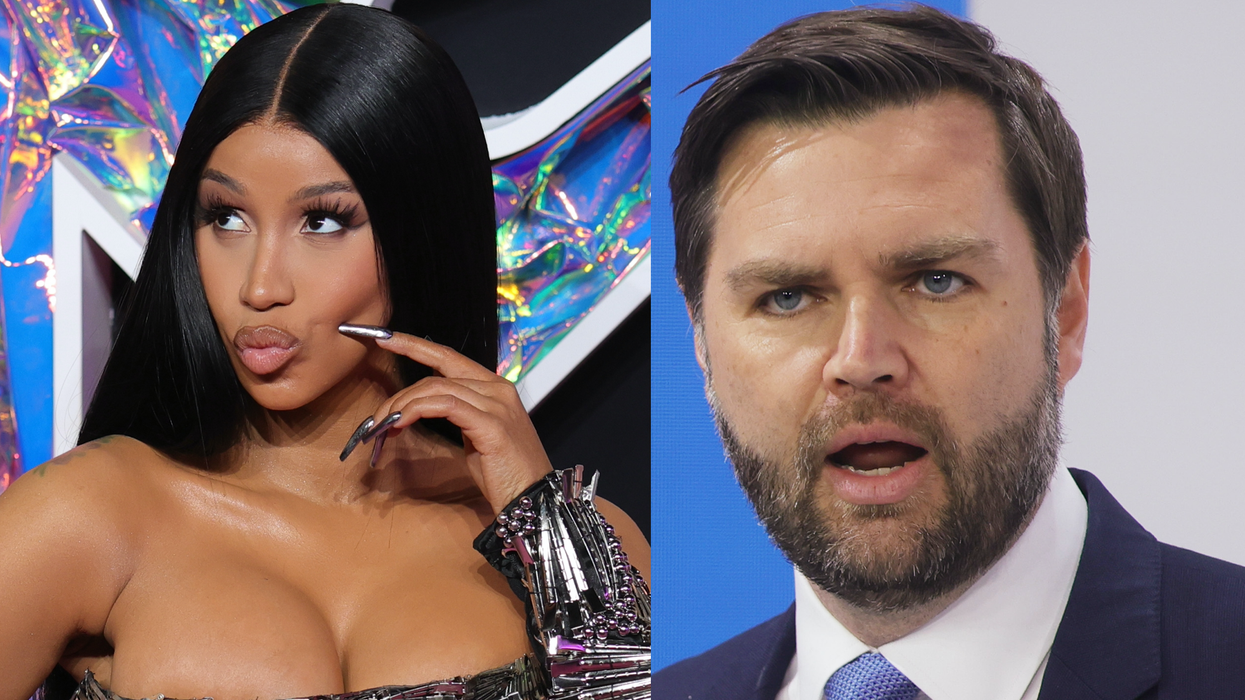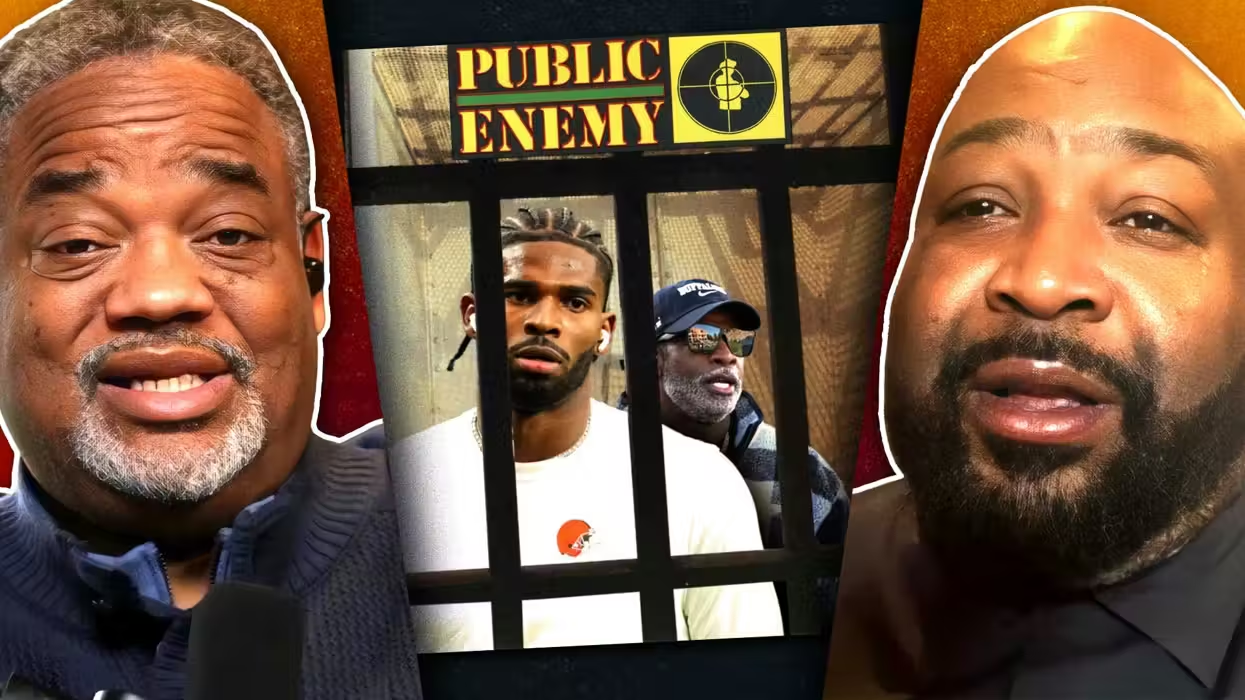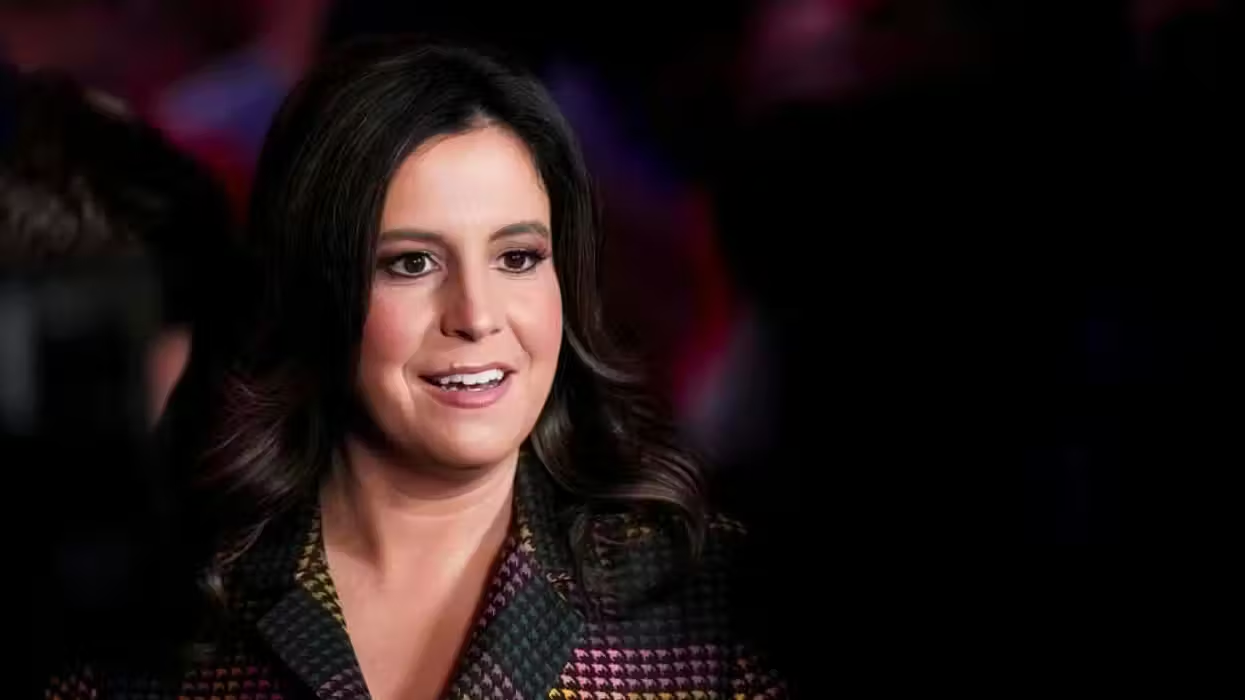© 2025 Blaze Media LLC. All rights reserved.
You Can't Be Moral & Believe in God'?: Penn Jillette Sits Down with The Blaze -- and Credits Glenn Beck
June 05, 2012
"Atheists will be a little more, 'Be a good Christian and shut up.' And that always bothers me."
On Monday evening, magician, comedian, author and outspoken atheist Penn Jillette spoke at a Barnes & Noble in Manhattan, New York, about his thoughts on secularism and his most recent book, "God, No!" Donning his signature long hair, a hat and jeans, the forthright commentator answered questions and interacted with his eager audience. Following his speech and subsequent book signing, The Blaze sat down with him for a quick interview about his views on a plethora of theological issues.
Jillette and I shook hands, as he introduced himself with a friendly smile and we headed into a private room at the bookstore. Once seated, the entertainer openly answered each and every inquiry with ease and confidence.
During our talk -- and for a portion of his speech beforehand -- Jillette credited Glenn Beck as the inspiration for his book. There's irony here, of course, considering that the two commentators differ greatly when it comes to matters of faith. But according to Jillette, it was Beck who challenged him to write out his views on the atheist version of the Ten Commandments.

"It was Glenn who said, 'Write the atheist Ten Commandments' and I did what he told me to. I don't do everything Glenn tells me to, but in this case it worked out well," Jillette told me during our discussion, going on to give Beck accolades. "I really respect how open he is. He seems to be at a very deep level of intellectual. He seems to be willing to listen to other ideas."
Our discussion about Beck and the book quickly turned to atheism and the intense debate that has raged since the beginning of time between those who embrace the notion of a higher power and those who do not. Among the subjects discussed, Jillette was asked how he responds when Christians, among others, say that atheists can't be "good without God." Without pause, he responded.
"What I think is so odd is that whenever you back an evangelical into a corner, they will tell you 'God is good.' They will not say 'God is to be obeyed no matter what,'" Jillette said. "They will say 'God is good.' And once you've said 'God is good,' you've included atheists in good. You've included a morality that is outside."

It is this morality, Jillette explained, that is very important for atheists. While many Christians and religious people maintain that God is the source of all that is good, for people who don't believe, morality is something that is viewed as more universal in nature.
"Morality existing outside of God is a pretty important thing for atheists," he continued. "Morality only being within God, I think is part of the problem we have with some Muslims."
Jillette took the subject even further, though, highlighting a soundbite he's been known to use in the past. In contrast to the Christian argument that one cannot be good without the Lord, he said that it's quite possible to argue the opposite -- that one cannot be moral with God.
The premise for this assertion, of course, is rooted in the fear that people have when they consider that a higher power is watching over their every move. Rather than finding motivation in doing the right thing simply for the sake of it, individuals may find themselves acting simply because they are being observed by God. This, in Jillette's view, strips away the morality.
"My definition, for my children, for instance, is that I don't want my son to not hit my daughter when I'm watching, because he's afraid of being punished," he proclaimed in his booming voice. "I don't want him to not hit his sister when I'm watching, because he'll be rewarded. I want him to not hit his sister, because hitting people is wrong."
In a world that is often defined and described in 140 characters or less, Jillette will sometimes use quick soundbites that he doesn't necessarily embrace to spark conversation. For instance, he'll say, "You can't be moral and believe in God." Through some chuckles, he made sure to clarify that he believes one can "certainly be moral with God," however he doesn't see the two as mutually exclusive.

Jillette went on to discuss the underrepresentation of atheists in prison as well as the notion that there is no evidence that unbelievers are committing more immoral acts that their theistic counterparts. Rather than seeing spikes in alcoholism, pornography consumption and the like, Jillette claimed that these issues have no correlation when it comes to belief or disbelief in a higher power.
While many believers may dislike some of Jillette's comments on the issue of faith, he was free from any malice or rude intent during our discussion. In fact, he seemed bent on striking a balance between his own fervency and his belief that theists, too, should be vocally making their theological points. He even went on to say that proselytizing is something he believes in wholeheartedly. The comedian and magician even voiced his disagreement with the way that atheists stereotypically treat Christians who are open about their beliefs.
"The idea that atheists give that it's okay if [Christians] believe that stuff as long as they shut up is, I believe, an offensive and immoral," he said. "Atheists are a little more guilty of that. Atheists will be a little more, 'Be a good Christian and shut up.' And that always bothers me."
Jillette, who claims he was a believer until he read the entire Bible, was a Congregationalist before becoming a secularist. He maintained his religious beliefs until high school and he concludes that reading the holy book from cover to cover "is the fast route" to non-belief.
Want to leave a tip?
We answer to you. Help keep our content free of advertisers and big tech censorship by leaving a tip today.
Want to join the conversation?
Already a subscriber?
Billy Hallowell is a digital TV host and interviewer for Faithwire and CBN News and the co-host of CBN’s "Quick Start Podcast."
Billy Hallowell
Billy Hallowell is a digital TV host and interviewer for Faithwire and CBN News and the co-host of CBN’s "Quick Start Podcast."
more stories
Sign up for the Blaze newsletter
By signing up, you agree to our Privacy Policy and Terms of Use, and agree to receive content that may sometimes include advertisements. You may opt out at any time.
Related Content
© 2025 Blaze Media LLC. All rights reserved.
Get the stories that matter most delivered directly to your inbox.
By signing up, you agree to our Privacy Policy and Terms of Use, and agree to receive content that may sometimes include advertisements. You may opt out at any time.






